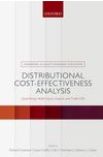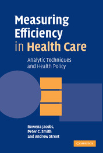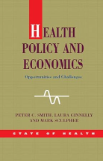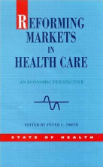|

|
Value of Information for Healthcare Decision-Making
|
Edited by: Anna Heath, Natalia Kunst, Christopher Jackson |
2024 |
 |
Distributional Cost-Effectiveness Analysis: Quantifying Health Equity Impacts and Trade-Offs |
Edited by: Richard Cookson, Susan Griffin, Ole F. Norheim, Anthony J. Culyer |
2020 |
 |
Global health economics shaping health policy in low and middle-income countries |
Edited by: Paul Revill, Marc Suhrcke (University of York, UK and Luxembourg Institute of Socio-Economic Research, Luxembourg), Rodrigo Moreno-Serra, and Mark Sculpher |
2020 |
 |
Maynard matters
or downloadable:
Maynard Matters (PDF  , 5,101kb) , 5,101kb)
Maynard Matters epub ( 2,134kb download) 2,134kb download)
Maynard Matters kindle ( 4,785kb download) 4,785kb download)
|
Richard Cookson, Maria Goddard, Trevor Sheldon |
2016 |
 |
Methods for the economic evaluation of health care programmes (fourth edition) |
Michael Drummond, Mark Sculpher, Karl Claxton, Greg Stoddart, George Torrence |
2015 |
 |
Making mental health count: the social and economic costs of neglecting mental health care |
Emily Hewlett, Valerie Moran |
2014 |
 |
Waiting time policies in the health sector, what works? |
Luigi Siciliani, Michael Borowitz, Valerie Moran |
2013 |
 |
Applied health economics (second edition) |
Andrew Jones, Nigel Rice, Teresa Bago d'Uva, Silvia Balia |
2013 |
 |
The humble economist
or downloadable:
The Humble Economist (PDF  , 2,916kb) , 2,916kb) |
Richard Cookson, Karl Claxton |
2012 |
 |
The ideas and influence of Alan Williams: Be reasonable - do it my way! |
Anne Mason, Adrian Towse |
2008 |
 |
The Elgar companion to health economics |
Andrew Jones |
2006 |
 |
Decision modelling for health economic evaluation |
Andrew Briggs, Karl Claxton, Mark Sculpher |
2006 |
 |
Formula funding of public services |
Peter C. Smith |
2006 |
 |
Measuring efficiency in health care |
Rowena Jacobs, Peter C Smith |
2006 |
 |
Health policy and economics: Opportunities and Challenges (State of Health) |
Peter C Smith, Mark Sculpher, Laura Ginnelly |
2004 |
 |
Cultures for performance in health care |
Russell Mannion, Huw T.O. Davies, Martin N. Marshall |
2004 |
 |
Microeconomics (third edition) |
Hugh Gravelle, Ray Rees |
2004 |
 |
Health care performance and organisational culture |
Tim Scott, Russell Mannion, Huw Davies, Martin Marshall |
2003 |
 |
Economic evaluation in health care: merging theory with practice |
Michael Drummond, Alistair McGuire |
2001 |
 |
Health economics for developing countries |
Sophie Witter, Tim Ensor, Matthew Jowett, Robin Thompson |
2000 |
 |
Reforming markets in health care: an economic perspective |
Peter C. Smith |
2000 |